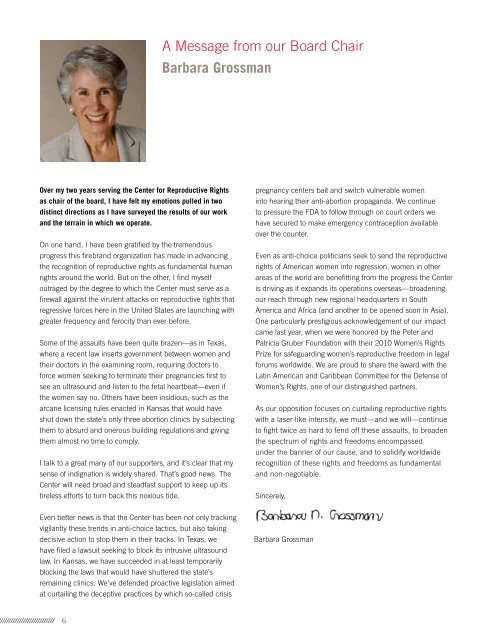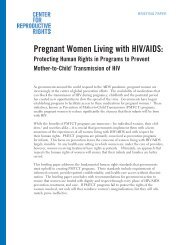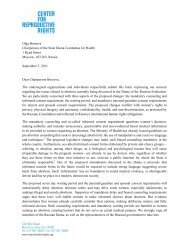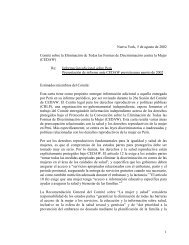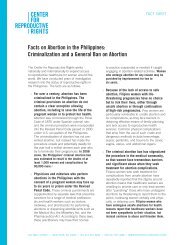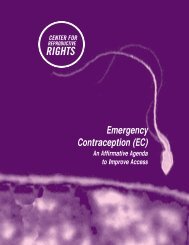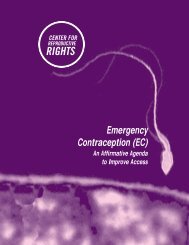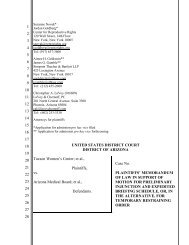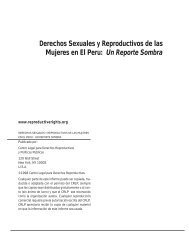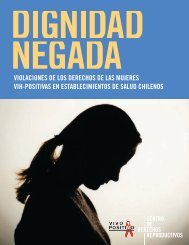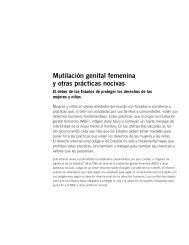Annual Report 2010-2011 - Center for Reproductive Rights
Annual Report 2010-2011 - Center for Reproductive Rights
Annual Report 2010-2011 - Center for Reproductive Rights
- No tags were found...
You also want an ePaper? Increase the reach of your titles
YUMPU automatically turns print PDFs into web optimized ePapers that Google loves.
A Message from our Board ChairBarbara GrossmanA Message from our President and CEONancy NorthupOver my two years serving the <strong>Center</strong> <strong>for</strong> <strong>Reproductive</strong> <strong>Rights</strong>as chair of the board, I have felt my emotions pulled in twodistinct directions as I have surveyed the results of our workand the terrain in which we operate.On one hand, I have been gratified by the tremendousprogress this firebrand organization has made in advancingthe recognition of reproductive rights as fundamental humanrights around the world. But on the other, I find myselfoutraged by the degree to which the <strong>Center</strong> must serve as afirewall against the virulent attacks on reproductive rights thatregressive <strong>for</strong>ces here in the United States are launching withgreater frequency and ferocity than ever be<strong>for</strong>e.Some of the assaults have been quite brazen—as in Texas,where a recent law inserts government between women andtheir doctors in the examining room, requiring doctors to<strong>for</strong>ce women seeking to terminate their pregnancies first tosee an ultrasound and listen to the fetal heartbeat—even ifthe women say no. Others have been insidious, such as thearcane licensing rules enacted in Kansas that would haveshut down the state’s only three abortion clinics by subjectingthem to absurd and onerous building regulations and givingthem almost no time to comply.I talk to a great many of our supporters, and it’s clear that mysense of indignation is widely shared. That’s good news. The<strong>Center</strong> will need broad and steadfast support to keep up itstireless ef<strong>for</strong>ts to turn back this noxious tide.Even better news is that the <strong>Center</strong> has been not only trackingvigilantly these trends in anti-choice tactics, but also takingdecisive action to stop them in their tracks. In Texas, wehave filed a lawsuit seeking to block its intrusive ultrasoundlaw. In Kansas, we have succeeded in at least temporarilyblocking the laws that would have shuttered the state’sremaining clinics. We’ve defended proactive legislation aimedat curtailing the deceptive practices by which so-called crisispregnancy centers bait and switch vulnerable womeninto hearing their anti-abortion propaganda. We continueto pressure the FDA to follow through on court orders wehave secured to make emergency contraception availableover the counter.Even as anti-choice politicians seek to send the reproductiverights of American women into regression, women in otherareas of the world are benefitting from the progress the <strong>Center</strong>is driving as it expands its operations overseas—broadeningour reach through new regional headquarters in SouthAmerica and Africa (and another to be opened soon in Asia).One particularly prestigious acknowledgement of our impactcame last year, when we were honored by the Peter andPatricia Gruber Foundation with their <strong>2010</strong> Women’s <strong>Rights</strong>Prize <strong>for</strong> safeguarding women’s reproductive freedom in legal<strong>for</strong>ums worldwide. We are proud to share the award with theLatin American and Caribbean Committee <strong>for</strong> the Defense ofWomen’s <strong>Rights</strong>, one of our distinguished partners.As our opposition focuses on curtailing reproductive rightswith a laser-like intensity, we must—and we will—continueto fight twice as hard to fend off these assaults, to broadenthe spectrum of rights and freedoms encompassedunder the banner of our cause, and to solidify worldwiderecognition of these rights and freedoms as fundamentaland non-negotiable.Sincerely,Barbara GrossmanEven those who do not monitor our issues as vigilantly as wedo cannot have missed the sustained assault that anti-choice<strong>for</strong>ces have mounted this year across the United States—ascorched-earth campaign the likes of which we have neverseen be<strong>for</strong>e, and against which we are fighting with all theresources we can muster.While we are fully engaged in this battle, this year also markeda significant step in our institutional development: We alsoopened regional offices in Colombia and Kenya, and will openan Asian office next year. While many understand how thismove will strengthen our effectiveness in fulfilling our mission,some have asked me: Is this the right time <strong>for</strong> investmentinternationally when so much is at risk in the U.S.?My answer: Absolutely.The fundamental principles at stake in the struggle <strong>for</strong>reproductive rights—women’s rights to life, health, dignity,equality, and autonomy—remain constant from one nation tothe next. Attacks on these principles in one region representa threat to women in others. And every legal victory advancingreproductive rights—no matter where in the world it isattained—is a building block <strong>for</strong> strengthening the protectionof these rights elsewhere. <strong>Rights</strong>, justice, and ideas areinfectious: We cannot seal our borders to them.We reported last year on the Supreme Court of Nepal’swatershed ruling that the government has a constitutionalobligation to pay <strong>for</strong> poor women’s abortions. With thisdecision, a nation that until 2002 criminalized abortion—imprisoning many women who terminated their pregnancies,and consigning countless more to suffer and die fromunsafe, illicit abortions—became a nation whose governmentis obligated to guarantee access to safe and af<strong>for</strong>dableabortion services.A few months ago, the court issued its opinion, reasoningthat “if the ability to decide whether or not to reproduce isdenied, the outcome cannot be considered to constitute thefulfillment of one’s highest duty, and instead… becomes a<strong>for</strong>m of slavery.” This truth of life and law is not nation-bound,but fundamental. And the Nepalese court understood verywell the border-surpassing power of progressive ideas; itsdecision explicitly references precedents established by theU.S. Supreme Court in Roe v. Wade.Our challenge and our duty now is to ensure that themessage sent by the victory in Nepal resounds far beyondthat nation’s borders—including in the U.S., where the hardwonprecedents of the past seem more and more imperiledevery day.This is the <strong>Center</strong>’s highest objective: to build a trueglobal framework <strong>for</strong> establishing reproductive rights asinalienable and defending them against the assaults thatwill inevitably be leveled.In the following pages, you will read about the progress wehave made toward this ambitious goal in <strong>2010</strong> and <strong>2011</strong>—and the challenges we are still fighting to overcome as we looktoward 2012. In some places, the picture it paints is inspiring;in others, it is infuriating.But in all places, it is a picture in which the <strong>Center</strong> is present,and vigilant, and taking action to ensure that—no matterhow high the barriers erected by our opposition—there is noborder in the world that our ef<strong>for</strong>ts to expand reproductiverights <strong>for</strong> all women will not ultimately transcend.Sincerely,Nancy Northup6 7 center <strong>for</strong> reproductive rights


